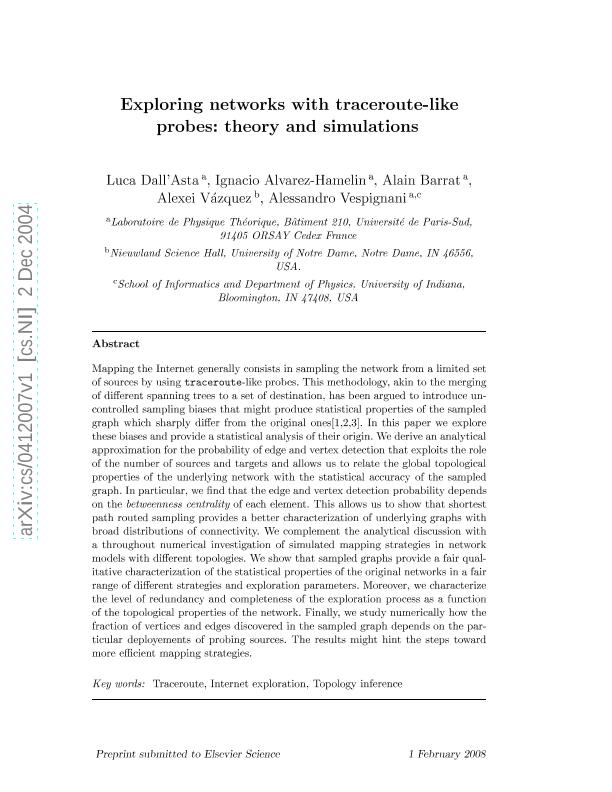Mostrar el registro sencillo del ítem
dc.contributor.author
Dall'Asta, Luca
dc.contributor.author
Alvarez Hamelin, José Ignacio

dc.contributor.author
Barrat, Alain
dc.contributor.author
Vázquez, Alexei
dc.contributor.author
Vespignani, Alessandro
dc.date.available
2017-07-10T19:06:16Z
dc.date.issued
2006-04
dc.identifier.citation
Dall'Asta, Luca; Alvarez Hamelin, José Ignacio; Barrat, Alain; Vázquez, Alexei; Vespignani, Alessandro; Exploring networks with traceroute-like probes: theory and simulations; Elsevier Science; Theoretical Computer Science; 355; 1; 4-2006; 6-24
dc.identifier.issn
0304-3975
dc.identifier.uri
http://hdl.handle.net/11336/20027
dc.description.abstract
Mapping the Internet generally consists in sampling the network from a limited set of sources by using traceroute-like probes. This methodology, akin to the merging of different spanning trees to a set of destination, has been argued to introduce uncontrolled sampling biases that might produce statistical properties of the sampled graph which sharply differ from the original ones. In this paper, we explore these biases and provide a statistical analysis of their origin. We derive an analytical approximation for the probability of edge and vertex detection that exploits the role of the number of sources and targets and allows us to relate the global topological properties of the underlying network with the statistical accuracy of the sampled graph. In particular, we find that the edge and vertex detection probability depends on the betweenness centrality of each element. This allows us to show that shortest path routed sampling provides a better characterization of underlying graphs with broad distributions of connectivity. We complement the analytical discussion with a throughout numerical investigation of simulated mapping strategies in network models with different topologies. We show that sampled graphs provide a fair qualitative characterization of the statistical properties of the original networks in a fair range of different strategies and exploration parameters. Moreover, we characterize the level of redundancy and completeness of the exploration process as a function of the topological properties of the network. Finally, we study numerically how the fraction of vertices and edges discovered in the sampled graph depends on the particular deployements of probing sources. The results might hint the steps toward more efficient mapping strategies.
dc.format
application/pdf
dc.language.iso
eng
dc.publisher
Elsevier Science

dc.rights
info:eu-repo/semantics/openAccess
dc.rights.uri
https://creativecommons.org/licenses/by-nc-nd/2.5/ar/
dc.subject
Traceroute
dc.subject
Internet Exploration
dc.subject
Topology Inference
dc.title
Exploring networks with traceroute-like probes: theory and simulations
dc.type
info:eu-repo/semantics/article
dc.type
info:ar-repo/semantics/artículo
dc.type
info:eu-repo/semantics/publishedVersion
dc.date.updated
2017-07-10T14:53:09Z
dc.journal.volume
355
dc.journal.number
1
dc.journal.pagination
6-24
dc.journal.pais
Países Bajos

dc.journal.ciudad
Ámsterdam
dc.description.fil
Fil: Dall'Asta, Luca. Universite Paris Sud; Francia. Centre National de la Recherche Scientifique; Francia
dc.description.fil
Fil: Alvarez Hamelin, José Ignacio. Universite Paris Sud; Francia. Centre National de la Recherche Scientifique; Francia. Consejo Nacional de Investigaciones Científicas y Técnicas; Argentina
dc.description.fil
Fil: Barrat, Alain. Universite Paris Sud; Francia. Centre National de la Recherche Scientifique; Francia
dc.description.fil
Fil: Vázquez, Alexei. University Of Notre Dame; Estados Unidos
dc.description.fil
Fil: Vespignani, Alessandro. Universite Paris Sud; Francia. Centre National de la Recherche Scientifique; Francia. Indiana University; Estados Unidos
dc.journal.title
Theoretical Computer Science

dc.relation.alternativeid
info:eu-repo/semantics/altIdentifier/doi/http://dx.doi.org/10.1016/j.tcs.2005.12.009
dc.relation.alternativeid
info:eu-repo/semantics/altIdentifier/url/http://www.sciencedirect.com/science/article/pii/S0304397505009126
dc.relation.alternativeid
info:eu-repo/semantics/altIdentifier/url/https://arxiv.org/abs/cs/0412007
Archivos asociados
